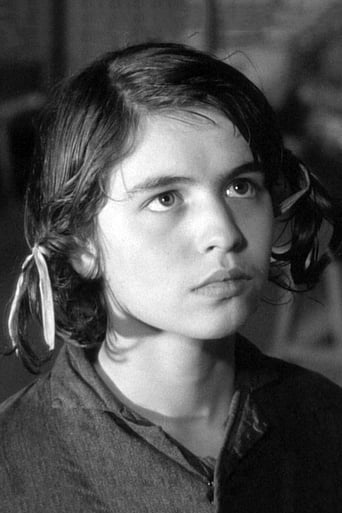Beystiman
It's fun, it's light, [but] it has a hard time when its tries to get heavy.
pointyfilippa
The movie runs out of plot and jokes well before the end of a two-hour running time, long for a light comedy.
Tobias Burrows
It's easily one of the freshest, sharpest and most enjoyable films of this year.
chaos-rampant
Among the best things that can happen to me as a viewer is to watch a filmmaker grow into mastery, and I've just gone through a series of viewing where Bresson grew before my eyes. He wasn't a master before Balthazar in my estimation but he was one now.See, he had started with ambitious work in Diary of a Priest, but something must have troubled him, the spiritual search was coming off as emotional anguish, resulting in sentimentality. His next three were all about finding ways to quell this, fasting the eye, muting the emotion. This is all the more reason to celebrate him, because it could have gone either way. He could have turned out film after film where he mutes expression and turns actors into bare stumps and called it pure. But if this was purity, where was the life in which the pure is woven through? Bresson matters I believe because he left the stone floor of his ascetic phase to grow into this, his sculpting phase.This is a sculpture of moving image and sound, even more so than Balthazar, even more purely about the rooms and spaces in which a young girl faces the duplicity of life. It's all in how he chisels the air with the camera, he does this in three parts. The day before, with its moments of small everyday cruelty and unexpected kindness alike. She has a beautiful voice but won't sing with her classmates until forced, a passing woman unexpectedly gives her money for the bumping cars, but her dalliance with a boy is cut short and she has to go sit with her father. It's heart-aching because all she needs is someone to mind her and no one does outside of making her behave how they want to, most of us have been savaged this way as kids.The night of unfathomable emotions out in the woods, and look how masterfully. Why she does what she does in the cabin, why she swears to protect his secret and professes love, perhaps intuitively protecting herself, perhaps asserting herself against authority, this is all as unfathomable as why the man goes back out to commit violence. It's all in that shot where the two men laugh, for no reason other than all this being absurd, beneath a dark sky, and the wind that blows all through the night.In the third part of the film we have the day after, with this complicated human nature brought to the stark light of what other people think. Bresson shows us judgment and cynicism, and even the old woman's advice about death is waved off; too musty for a young girl, more advice.So how poignant to see this shift in Bresson? He gives us by the end a more eloquent Jeanne D'arc, now the dogmatist interrogators become your small-minded neighbors and Joan is neither pure nor certain in any way about the truth of what she experienced. No ceremonial death. And how deep it cuts, that she may have wanted to ask her mother for advice, unburden the confusion, but has to go through it alone.So after a series of Bresson viewings, I will come to rest here. Antonioni would take home the Palm that year but Bresson had conquered his obstacles and arrived fully. The title of Tarkovsky's book best describes what he does here, and you can see the Tati influence as a new tool that he didn't have back in Pickpocket. He sculpts an external time, but now in such a way that the pure is found where it grows roots and rustles, among life.It would be Tarkovsky's turn now to shoulder this legacy, and Dreyer's, asking himself, what kind of time? We dream and yearn with an asymmetric logic and mingle with our reflection. It would be one of the great leaps in the cinema but for that we'd have to go forward.
Pierre_D
Mouchette is a young girl living in an indeterminate village in France. Her mother is dying, her younger sibling needs constant care and her father is an abusive drunk. Her life consists of going to school, where she will never fit in because of her one piece of clothing and taciturn behaviour, and then going home through the fields next to the school.Mouchette's expressions tell all you need to know. She speaks perhaps a dozen words throughout the film but you feel her joy as she is allowed to play bumper cars at the carnival, to her frustration after her father refuses her any more amusement, to her fear and agony as she falls victim to a man she thought she could trust. In an environment where the church and patriarchy hang above any woman's head, this is not an easy life by far.The film reaches its zenith when Mouchette has to hide from a heavy rainstorm on the way back home. She loses one of her galoshes and a poacher named Arsène (who splendidly recreates an epileptic seizure), takes her to his cabin to warm her and speak to her about his fight with the gamekeeper. The price for his help is enormous and breaks the young girl beyond repair. She tries to speak to her mother about it, but mother is dying. Her father and brother mistrust her. When her mother dies, finally the neighborhood shows a little compassion, but this turns to judgment and even a gift of new clothing cannot reconcile her to her peers.The final scene is epochal, with Mouchette rolling around in the grass (apparently pleasurably) before we see she is trying to reach a certain area, to tragic results.Mouchette is suffering, isolation and a small dash of hope, and a must see film.
gliptitude
mouchette may have been ruined for me by the jean luc godard "cut" trailer that i watched on the DVD before watching the film. this trailer demonstrates and exaggerates the pornographic aspects of the film. the film is much less sensational than the trailer suggests, but there is that aspect of it. for example, it was not necessary to film schoolgirls swinging upside down on a playground, flashing their panties. it's not outrageous when you see it in context, in the film - rather it is as un-pornographic as that subject could be. but after seeing the godard trailer it is hard not to see the whole film through his eyes, and hear as if from a fellow viewer, perverted snickering during each such scene.i disagree with the IMDb commentator who claims the "one happy scene" of the movie to be boring and lifeless. the bumper car scene is brilliant. the entire time (it is a drawn out scene) i was thinking, "why have i never seen a bumper car scene?" and "what an interesting social dynamic bumper cars are." aside from entertaining, it alone also shows that mouchette is a regular girl, and not always a victim.i prefer A MAN ESCAPED and PICKPOCKET. these are the only 3 bresson films i've seen.
makpet
Bresson one of the true architects of modern cinema found in this story the perfect distillation of form and content coupling his pared down style with the poignant story of a young french girl trying to live through impoverished circumstances and doing her best to survive. Being one of my heroes I have always had nothing but total respect for the way he intellectualized every aspect of film-making without denuding it of emotional impact. A chemist of cinematic ingenuity there will never be a more profoundly personal look at cinema than that of Bresson. May the film-makers of today at least make the effort to rob from this man. Viva Bresson!




